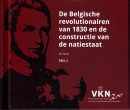Product informatie
- ISBN 9789089647030
- ISBN 10 9089647031
- Druk 1
- Bindwijze Paperback
- Taal Engels
- Uitgever Amsterdam University Press
- Onderwerp Nieuwe geschiedenis (1500-1870)
- Beschikbaar sinds 2 Februari 2015
Samenvatting
Chapter 1: \'Multilingualism: An Introduction\'[-]Chapter 2: \'Huygens\' Language Acquisition\'[-]Chapter 3: \'The "multidimensionality" of Huygens\' Multilingualism\'[-]Chapter 4: \'Huygens\' multilingualism in music, science and architecture\'[-]Chapter 5: \'Huygens and Translation\'[-]Chapter 6: \'Code Switching in Huygens\' work\'[-]Chapter 7: \'The multilingualism of Huygens\' children\'[-]Epilogue[-][-]Chapter 1: \'Multilingualism: An Introduction\' considers what multilingualism means when it is applied to an individual such as Huygens and then examines what I call the \'multilingual landscape\' of the United Provinces in the early modern period. By this I mean ... what factors contributed to multilingualism in the United Provinces at this time, which languages were used, in which social domains or communities these languages were written and spoken, and how their fortunes changed during the course of the early modern period. This will provide the necessary background for the rest of this study. [-]Chapter 2: \'Huygens\' Language Acquisition\' begins by discussing why Huygens learnt the eight languages that formed the core of his multilingualism and then considers in chronological order how he learnt and developed his knowledge of each language in his early years. In truth, his choice of languages is not in itself remarkable, and to a certain extent pre-determined as he was destined for a career in administration for the House of Orange. Rather it is the variety of ways in which Huygens applied his knowledge of these languages that is striking and demands our attention.[-]Chapter 3: \'The "multidimensionality" of Huygens\' Multilingualism\' picks up this theme and looks in detail at what makes Huygens\' multilingualism distinctive. After providing an account of how he used each of his core languages in his poetry and correspondence, I consider other languages with which he engaged, his use of Dutch dialects often for comic effect, his coinage of neologisms in a number of languages, evidence for his spoken use of languages and the multilingualism of his vast library. What becomes apparent is how his use of language was shaped by his great learning, his sense of humour and by his manifold interests beyond the relatively narrow confines of serving the House of Orange.[-]Chapter 4: \'Huygens\' multilingualism in music, science and architecture\' examines how Huygens used his linguistic knowledge in these three areas of extra-curricular activity. It was above all his knowledge of vernacular languages, notably French, Italian and English, which allowed him to read and write about each of these subjects and to establish networks for the exchange of ideas and information about them. Furthermore, his linguistic knowledge allowed him to open doors both for himself and others, which might otherwise have remained closed. [-]Chapter 5: \'Huygens and Translation\' discusses what Huygens himself had to say on the subject of translation, how he developed as a translator and what material he translated into which language. He translated primarily into Dutch, most notably nineteen poems by John Donne in the early 1630s. However, he also translated into other languages, in particular Latin and French, once more demonstrating his great versatility and dexterity as a linguist. One distinctive feature of Huygens\' translation is the extent to which he produced translations of his own poetry or \'self-translated\'. In two cases he produced poems in his eight core languages on the same theme. Here, the question arises as to whether he was translating or code switching. [-]Chapter 6: \'Code Switching in Huygens\' work\' picks up from the end of Chapter 5 and considers why Huygens practised code switching. Two principal influences seem to be at work in this regard; one is the notion of imitati
Meer boeken van uitgever Amsterdam University Press
Meer boeken met de onderwerpen Nieuwe geschiedenis (1500-1870)
Veel gestelde vragenmeer antwoorden
Hoe werkt Resale.nl?
Je kunt op de website advertentie(s) plaatsen van de boeken die u wilt verkopen. Een potentiële koper neemt dan contact met je op om samen een prijs af te spreken en de transactie verder af te handelen. Houdt hierbij onze aanbevelingen voor een veilige transactie in gedachten en voorkomt dat je slachtoffer wordt van oplichting.
Hoe kom ik in contact met de verkoper?
Je kunt een reactie versturen door bij de betreffende advertentie van de verkoper op de knop ‘doe een bod’ te drukken. Je kunt nu een bod doen op de advertentie en een persoonlijk bericht toevoegen. Het verstuurde bod brengt je in contact met de verkoper via e-mail.
Wat zijn de kosten voor het verkopen van mijn studieboeken?
Je kunt geheel gratis gebruik maken van de diensten van Resale.nl. Resale.nl haalt zijn inkomsten uit advertenties.
Hoe kan ik een boek kopen?
Resale.nl werkt globaal op de volgende manier:
- Zoek via het zoekveld het studieboek dat je wilt kopen.
- Uit de zoekresultaten kies je het studieboek waar je geïnteresseerd in bent.
- Op de detailpagina van het studieboek kun je een overzicht vinden van de personen die het studieboek verkopen.
- Je kunt nu een bod plaatsen door op de button te klikken. Het bod wordt via e-mail aan de verkoper verzonden.
- De verkoper van het studieboek neemt contact met je op door een reactie te geven op het bod dat je hebt verzonden. Met de verkoper kun je gezamenlijk een prijs afspreken. Houdt hierbij onze aanbevelingen voor een veilige overdracht in gedachten en voorkom dat u slachtoffer wordt van oplichting.
Hoe weet ik wat ik koop?
Om te achterhalen of wat je koopt ook daadwerkelijk is wat er wordt geadverteerd is het verstandig om bij de verkoper langs te gaan en het aangebodene te bezichtigen. Doe je dit niet, dan loopt je een zeker risico. Onder het kopje ‘Hoe kan ik de kans op misbruik verkleinen’ kun je meer over dit onderwerp vinden.
Kopers over Resale.nl
bart van gijsel
"Ik ben erg tevreden over deze verkoper de familie thus. Goede snelle levering."
Patrice Michel
"De verkoper heeft er alles aan gedaan om het door mij bestelde product zo snel mogelijk naar mij toe te krijgen. Heeft me van iedere stap op de hoogte ..."
marjolein
"Besteeling snel bezorg, in goede staat net zoals beschrijving en goede communicatie met verkoper!"
marjolein
"Goed contact, snel en in goede orde ontvangen. Staat van het boek was zo goed als nieuw!"
hilda1
"goede medewerking en hulp dank u wel"
Tineke
"Het bestelde werd netjes en snel afgeleverd. De prijs was goed."
stacy
"Goed verpaktBoek ziet er mooi uit"
elisa
"Goede levering alleen jammer dat er niet bij was gezet dat er al in geschreven was"
Elly
"Verkoper reageerde snel op mijn emails en heeft ook het boek snel opgestuurd.Het boek was niet van nieuw te onderscheiden. Was waarschijnlijk niet gebruikt. ..."
Gerard+[2]
"Prettig contact gehad en goed zaken kunnen doen."
















